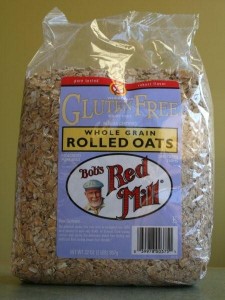Oats are one of the most confusing topics where celiacs are concerned. Can we or can’t we eat them? Why all of the misunderstanding? Oats are naturally gluten free, right?

Gluten Free Haggis

Gluten Free Oats
The concern is not the gluten free status of oats themselves but how they were grown. If oats are grown in a field where glutenous grains such as wheat, barley or rye were grown previously then these gluten containing grains may naturally grow in the oat field the following year causing contamination. The second concern is how the farmer processes the oats. If the same equipment is used to process all grains then contamination can occur here.
Ok, so regular oats are out but if they are certified gluten free oats does that mean they are safe for celiacs? Maybe…
Despite certified gluten free oats being gluten free, some people will have a reaction to oats in addition to being celiac. Avenin is the protein found in oats which in some celiacs will cause an immune response similar to gluten but it’s impossible to tell who oats will affect before people try them themselves.
It’s been 18 months since I was diagnosed as celiac and the same since I stopped eating oats. My dietician suggested that once I’m fully healed again I try a small amount of non contaminated oats to discover whether or not I have a reaction. I’ve been in this position of feeling great and healthy for over a year now but for some reason I’ve kept away from oats. I see various brands of ‘gluten free oats’ in supermakets but I haven’t found the right moment to try them as yet. I guess it’s probably because I’ve felt so good since going gluten free and I don’t want to risk feeling bad again.
I’ve never made oatmeal cookies in my life so I don’t miss them (although I may give them a shot if I discover I can eat oats!) and most of the oat containing products I come across are made from contaminated oats so it’s not like I can eat these things anyway. For me as a Scottish lass I miss a big bowl of porridge on a cold morning and I miss haggis which is always made with oats. Last week I came across some gluten free haggis so next month when I head back to Scotland would probably be a good time to test myself on oats! The question I have to ask is whether I want to risk being glutenated for a plate of haggis or whether I want to risk not eating oats ever again just incase I’m someone who will have a reaction?? I’d love to hear from you if you are a celiac who has reintroduced oats to your diet or if like me you aren’t sure about whether you should…
UPDATE: I have since eaten oats a few times and have always felt fine…no symptoms. I eat some gluten free bars which contain certified oats, haggis with gluten free oats and gluten free oatcakes. Today I’m planning to give oatmeal a shot too.
ANOTHER UPDATE: I have started to eat oatmeal every now and again and I appear to be fine with gluten free oats. Oats do not make up a large part of my diet but I’ll enjoy a breakfast bar containing gluten free oats, gluten free haggis, a gluten free oatmeal cookie or a bowl of oatmeal every so often. All the oats I eat are certified as being gluten free.
ANOTHER UPDATE 3.5 YEARS SINCE DIAGNOSIS: I rarely eat oats but recently when I have eaten gluten free oats I have had some recurring symptoms so I’m giving up on oats again. :-/
Do you feel safe eating gluten free certified oats? If you’ve tried oats, how did you feel?




Sofia Morais
Feb 7th, 2011I’d say… go for it!
I knew that story about oats contamination, but I didn’t know about avenine itself being a risk to some coeliacs. Like you I don’t eat oats for over an year, but as I’m not healed yet I’m not thinking of eating oats anytime soon. Anyway, if I’d got the chance to introduce oats to my diet, for the rest of my life, then, yes, I’d take the risk of feeling sick for a few days to get my answer.
Wouldn’t it be a good idea to try a reeeally small amount of oats at the first time?
John
Feb 7th, 2011My dietician also recommended I stay away from oats for the first year and slowly re-introduce them. I haven’t completed my first year yet so have not tried any oats.
I too did enjoy a bowl of porridge on a winter morning. My concern is if I try it again and I feel ok, will I be sure it is still not doing me any harm?
Tricky one – you do see “gluten-free” oats advertised where they have been processed in a safe environment but it’s the oats themselves having a protein similar to gluten which may cause an issue?
Laura
Feb 7th, 2011@Sophia. I agree. It’s probably best to try a small amount the first time to see if it affects us.
@John. I was thinking the same thing myself. Perhaps if we feel ok we could still be doing damage. I think that’s why doctors tend to recommend reintroducing oats with monitoring to ensure no damage is being done but this seems like a lot of hassle just for oats since there are very little safe ‘gluten free’ oats around anyway. The Canadian celiac association for example suggest that adults with CD should be able to eat up to 70 grams of oats per day. You would think there would be one answer across the board but sadly there is not.
steve
Sep 23rd, 2012hi , ive just tried gluten free porridge for the first time , iv,e been diagnosed coeliac for 8 years now and still find i am allergic to the avenin in the oats , it put me back to the pains and the bloating and all the other symptoms , so alas i was very much looking forward to the morning porridge but have had to eliminate oats from my diet .
Tim Raynor
Oct 30th, 2012I tried gluten free porridge oats and didn’t think they could be the cause of my symptoms (bloating and pain) returning. It took nearly a month for the symptoms to completely disappear once I had realised the cause.
I’d recommend that people should try a small amount and if symptoms appear stop immediately.